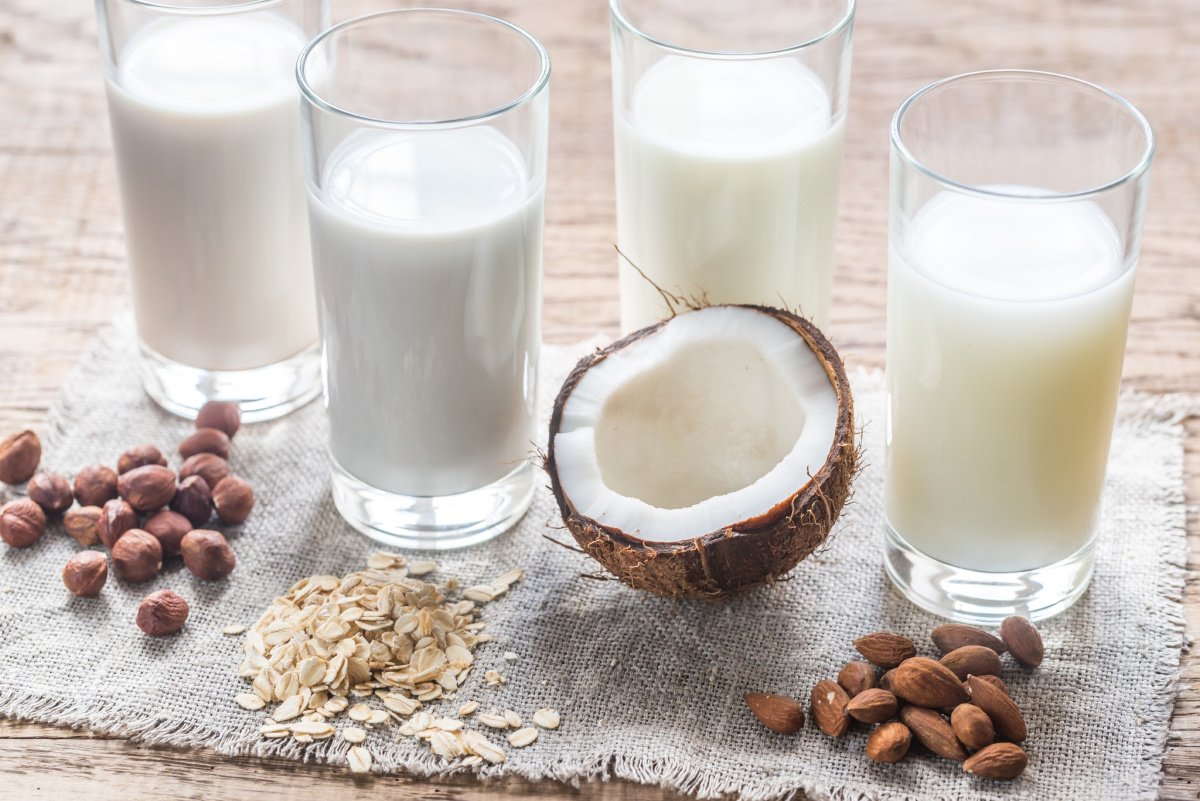
Grocery shopping these days is an adventure…literally. While all five of my kids are home during our shelter in place, plus my husband, and are eating at least three meals a day, our kitchen is never closed. I limit my trips to the store to just two each week because we seem to burn through our staples, one of those being milk. I currently buy three different kinds of milk for my crew: chocolate, 2%, and unsweetened almond. Does that sound crazy?
Years ago, my daughter discovered she was pretty lactose intolerant and I started buying almond milk for her. But now there is a whole section at the grocery story dedicated to nut milks, or dairy alternatives, and I have no idea if one is better than the other. So rather than continuing to just buy almond milk blindly, I asked my friend and health coach Molly O’Neil if she could help me break down the differences among them. Molly is a certified health coach from the Institute for Integrative Nutrition—as well as the owner of mPowering Health & Wellness. You may also know Molly from the delicious healthy treats she makes called Molls Balls.
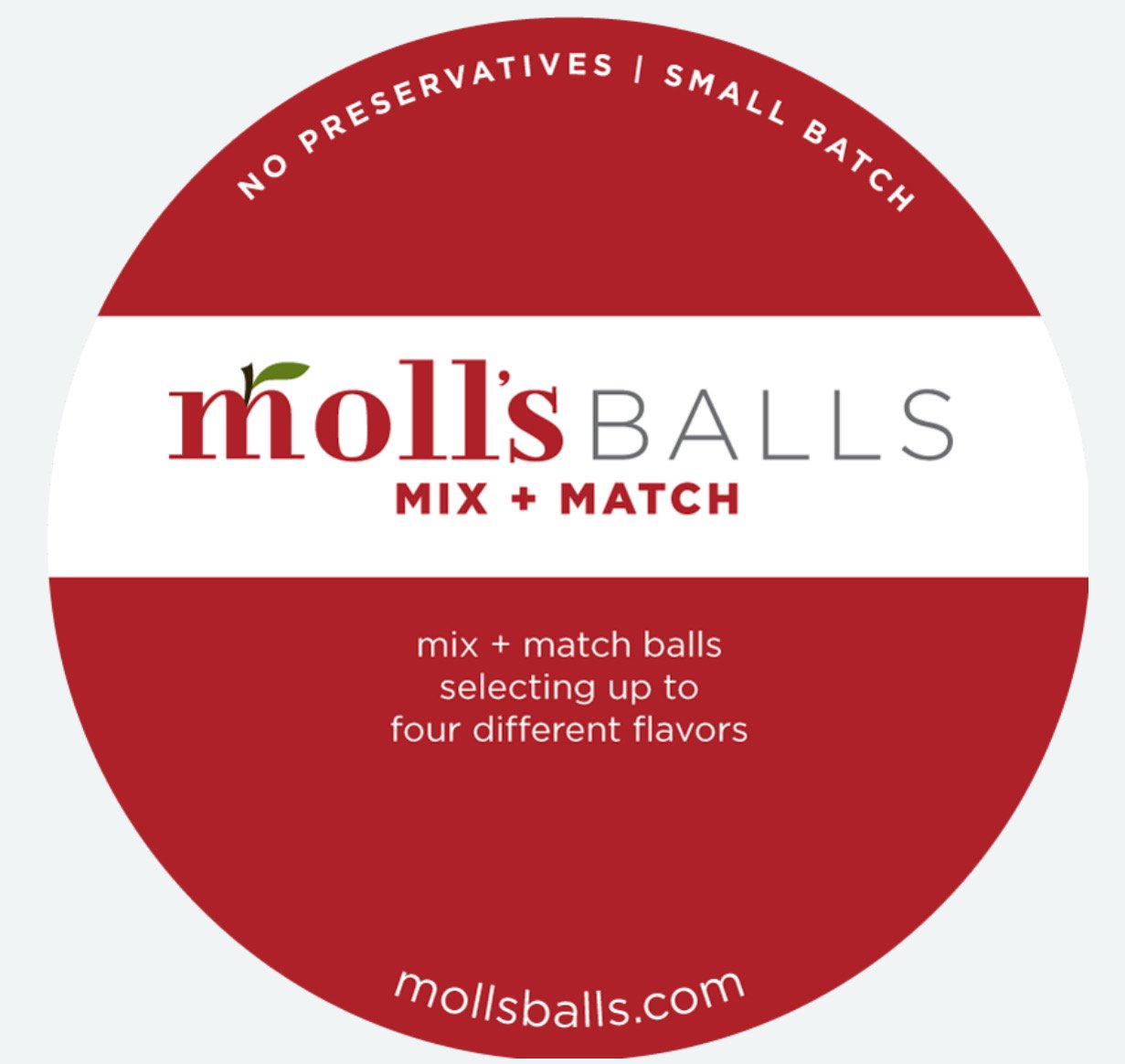
“Because dairy milk is one of the top inflammatory foods (contributing to
auto-immune flare-ups, asthma and allergies, and can be difficult to digest), I don’t promote drinking it as an adult,” says Molly. “Luckily, there are plenty of non-dairy options out there, but I believe everything we eat or drink should be done in moderation and this includes milks. So I try to rotate either weekly or daily, which type I’m drinking and I always choose unsweetened versions (some have up to 8 grams of added sugar) and organic, if possible.”
Below, Molly breaks down the good and the bad of almond, oat, coconut, hemp, and pea protein milks.
Almond Milk
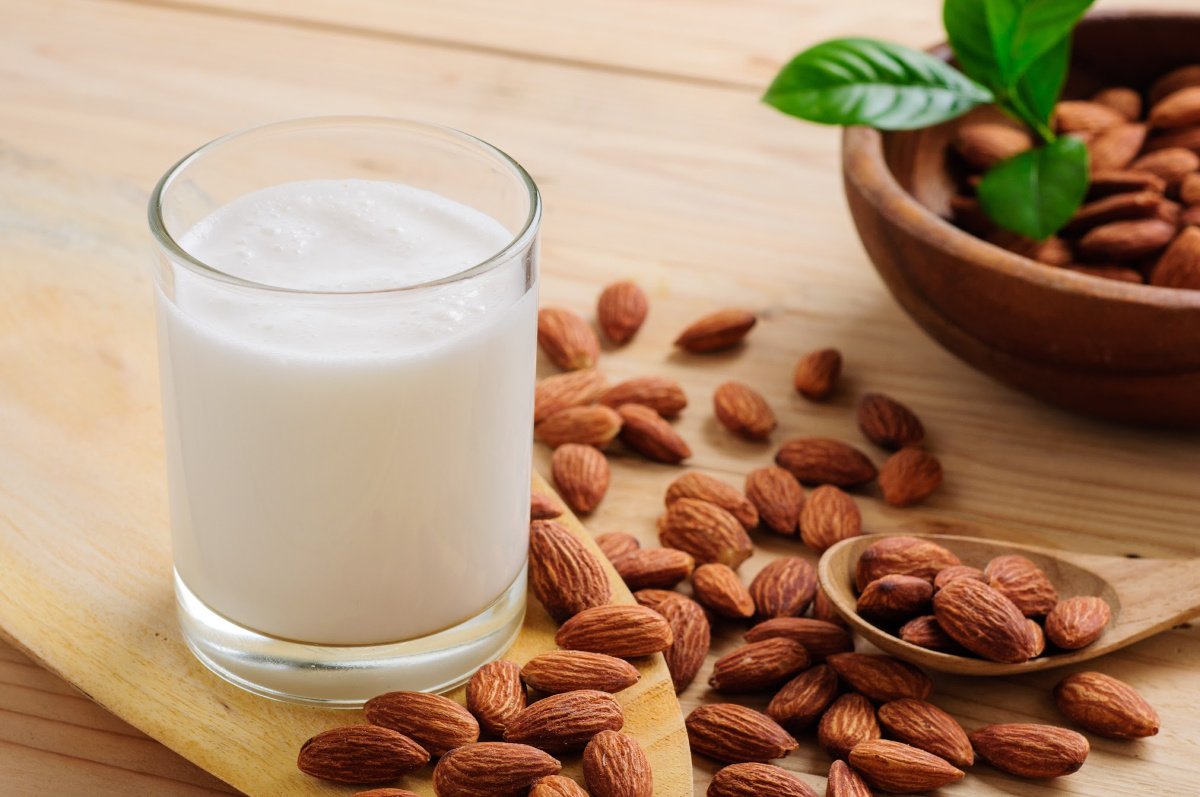
“My personal go-to is almond milk because it’s full of vitamins and heart-healthy fats, and it’s also the lowest milk in calories,” says Molly. “It has the consistency of a skim dairy milk and is great in cereal, smoothies, and baked goods.”
Almond Milk Nutritional Facts
Almond milks contains half a day’s recommended intake of vitamin E, a significant amount of vitamin D (if store-bought), and a hearty dose of calcium. It’s also extremely low in calories compared to other milk products and can be a valuable tool if you’re trying to lose weight fast. In fact, the majority of calories from fat in each serving are from heart-healthy mono- and polyunsaturated fatty acids, both of which have been tied to a long list of health benefits.
One cup of unsweetened almond milk contains approximately:
- 40 calories
- 1 gram protein
- 3 grams total fat
- 1 gram dietary fiber
Is almond milk good for you?
In addition to supplying a hearty dose of several essential nutrients, almond milk has been linked to some pretty impressive health benefits:
- Besides being low in calories, almond milk has minimal impact on blood sugar levels, which can help protect against spikes and crashes and help keep you on track towards your weight loss goals.
- Almond milk is jam-packed with healthy fats, including both mono- and polyunsaturated fats. By swapping the saturated fats in your diet with these nutritious fats instead, you can potentially protect against coronary heart disease.
- Although almond milk may not contain as much vitamin D or protein per serving as cow’s milk, almond milk is still a great source of calcium, vitamin D and magnesium, all of which play a key role in maintaining bone health.
- Almond milk is loaded with vitamin E, a micronutrient that doubles as a powerful antioxidant. Antioxidants work by fighting free radical damage in the body, which can be caused by sun exposure, a poor diet, pollution, and disease.
Oat Milk
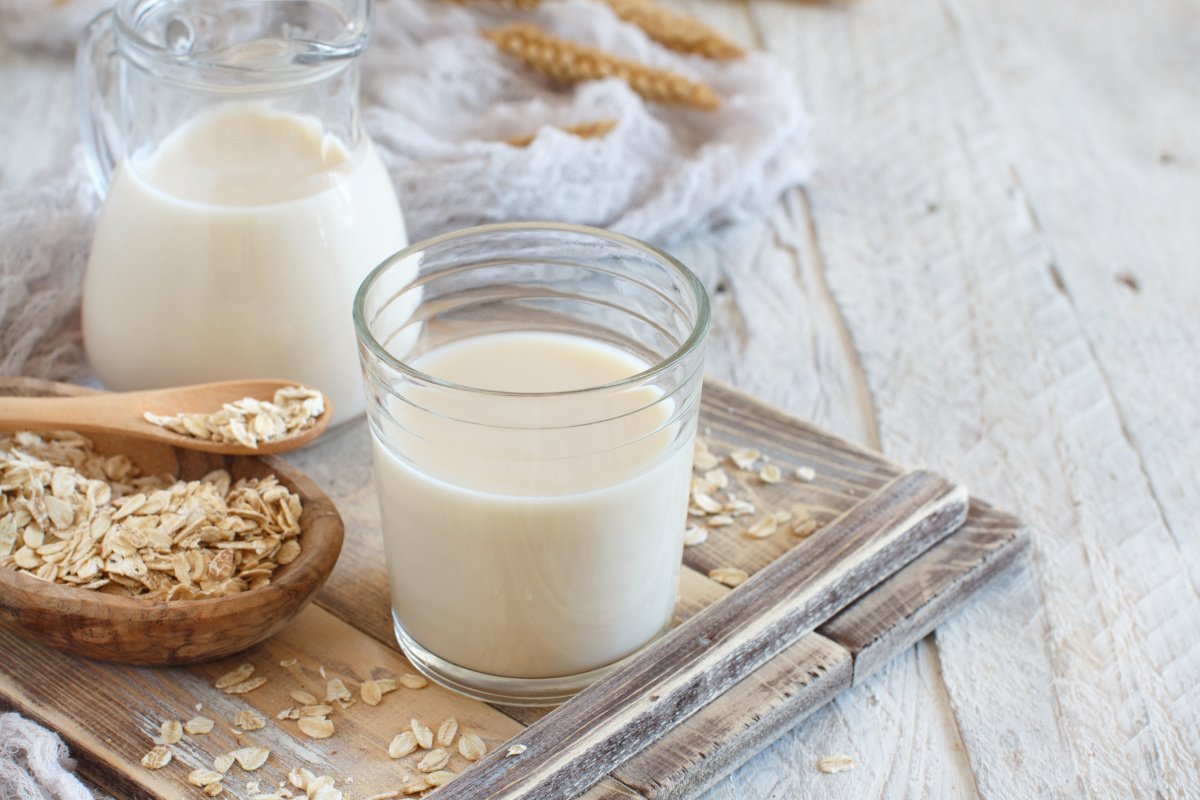
“My biggest concern with oat milk is that oats are a crop that is mass produced and majority of oat fields are sprayed with herbicides and pesticides, so I always try to opt for an organic oat milk,” explains Molly. “It’s more difficult to find but Chicano makes an organic oat milk that is great. My favorite new find is Malk Organics found at Whole Foods. It’s great in coffee.”
Oat Milk Nutritional Facts
Naturally free of dairy, oats are also gluten-free. Oat milk is relatively low in calories, but contains protein and is usually enriched with vitamins and minerals like calcium, riboflavin, and vitamin D. Commercial varieties may also contain added ingredients that are used to extend shelf life and enhance flavor.
One cup of oat milk contains approximately:
- 100 calories
- 4 grams protein
- 2.5 grams fat
- 2 grams dietary fiber
Is oat milk good for you?
- It’s made from oats and water, so it’s free of both dairy and lactose, making it an ideal substitute for those with dietary restrictions who may be following a dairy-free diet.
- Commercial oat milk is often enriched with both calcium and vitamin D, two important micronutrients that play a central role in bone health.
- Most commercial oat milks are a great source of vitamin D and vitamin A, two nutrients that are essential when it comes to enhancing immunity and warding off illness and infection.
- Oats are well-known for their heart-healthy benefits and ability to keep cholesterol levels in check.
Coconut Milk
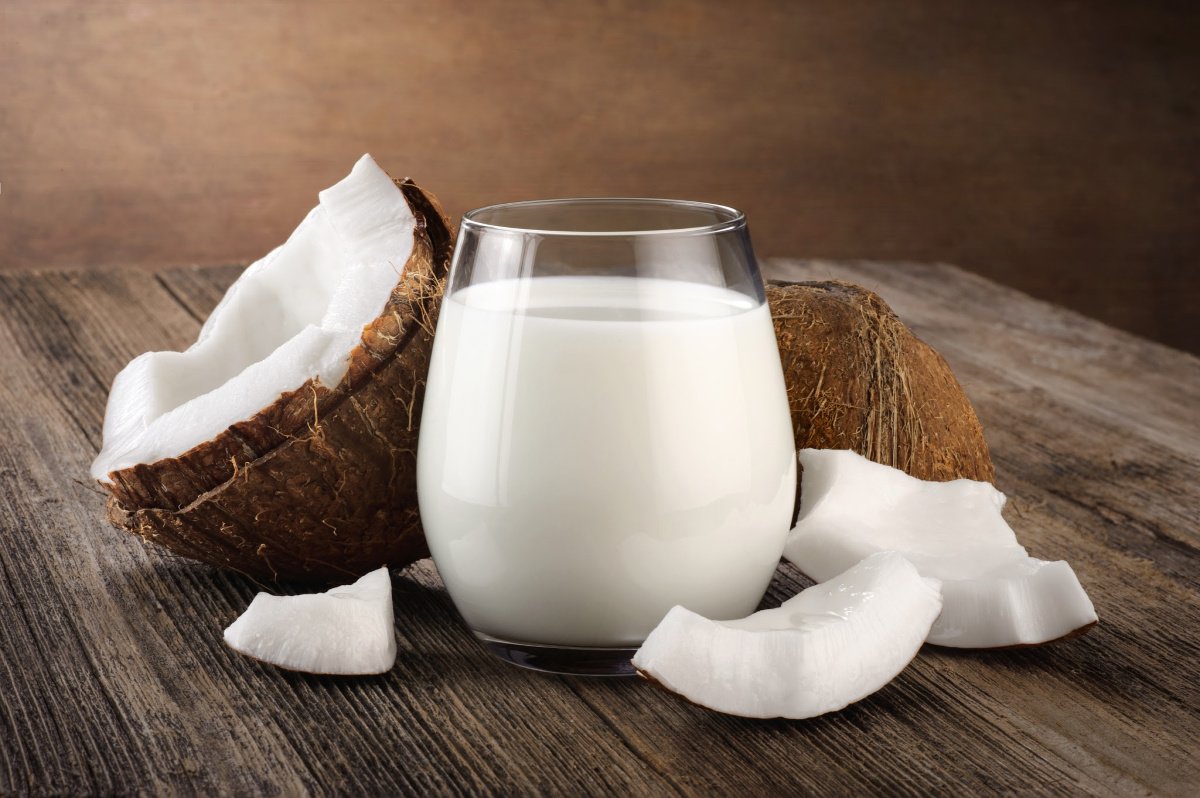
“Coconut milk is much higher in calories than other milk alternative options and has a distinct coconut taste.”
Coconut Milk Nutritional Facts
Since real, full-fat coconut milk is high in calories, it’s better to have a smaller serving than you would of regular milk or coconut water. About 1/4–1/2 cup at once is best, either as part of recipes (for example as “coconut whipped cream”) or on its own combined with other flavors (such as in a smoothie).
One cup of raw coconut milk contains approximately:
- 552 calories
- 5.5 grams protein
- 57.2 grams fat
- 5.3 grams fiber
- 2.2 milligrams manganese (110 percent DV)
Is coconut milk good for you?
- Coconut milk may improve heart health by lowering blood pressure and cholesterol. Coconuts are one of the best sources of lauric acid that is easily absorbed and used by the body for energy.
- Studies find that the medium-chain triglycerides (MCT) fatty acids found in coconut milk nutrition may even enhance physical performance. Following exercise, muscles need
plenty of nutrients to repair and be restored—including electrolytes like magnesium and potassium that are found in coconut milk. Because coconut milk is high in healthy fats, it also helps fill you up and prevents overeating or snacking throughout the day. - Although coconut water is a higher source of electrolytes, coconut milk also provides important minerals like potassium and magnesium that are needed to maintain blood volume, regulate heart health, and prevent dehydration or diarrhea.
Hemp Milk
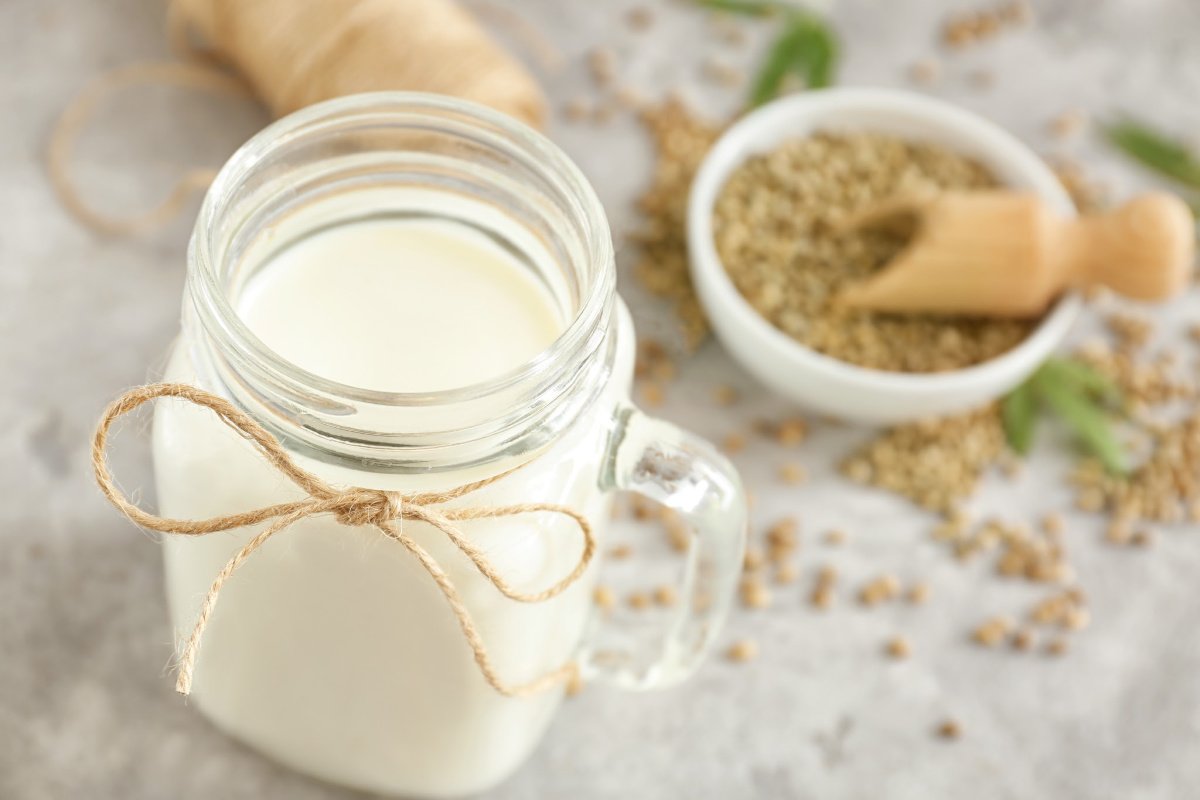
Hemp Milk Nutritional Facts
A dairy-free milk that’s rich in healthy fats, omega 3s, plant protein, vitamins, and minerals.
One cup of unsweetened hemp milk contains approximately:
• 70 calories
• 5 grams fat
• 2 grams dietary fiber
• 0 grams sugar
• 3 grams protein
Is hemp milk good for you?
- Hemp milk contains more plant-based protein than almond milk. Plus, it’s a complete protein, meaning it contains all essential amino acids.
- The unsaturated fatty acids found in hemp seeds help boost immunity, support brain health, reduce inflammation, and promote cell signaling.
- Drinking a cup of milk made from hempseed provides about 30 percent of your daily recommended value for calcium.
Pea Protein Milk
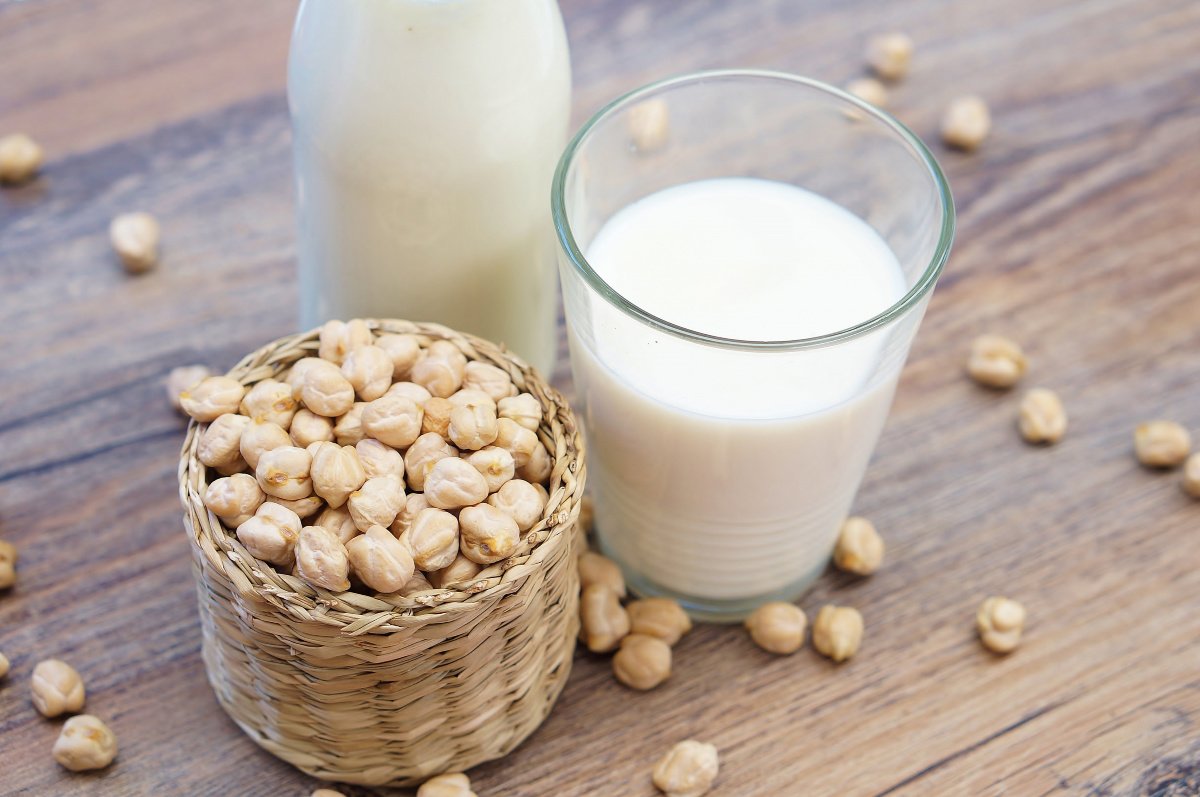
“Pea protein has a distinct flavor and thick consistency,” Molly says. “It’s not my favorite taste and has a bit more sugar than most, but pea protein is a great option for children who are lactose intolerant.”
Pea Protein Milk (such as Ripple) Nutritional Facts
Each serving of pea protein packs in a low amount of calories but is high in protein and fiber, as well as several other important micronutrients.
A single scoop of pea protein powder contains approximately:
• 120 calories
• 24 grams protein
• 2 grams fat
• 8 milligrams iron
Is pea protein milk good for you?
- Aids in weight loss
- Supports heart health
- Promotes kidney function
- Increases muscle thickness
- Balances blood sugar levels
One last note from Molly about soy milk:
“I won’t get into soy milk too much because I don’t promote it,” she says. “Soy, although a sure source of vegan protein, is also also a top inflammatory food. Soy milk is dairy-free and made from soy beans. But while it is plant-based and considered a complete protein with all of the essential amino acids that your body needs, it’s often not recommended because it’s high in phytoestrogens and likely derived from genetically modified and allergenic soy plants.”
A huge thank you to Molly O’Neil for all of the research she pulled together for this piece. I could never have done this post without her! If you’re interested in working with Molly or purchasing her Molls Balls, visit mollsballs.com.


